5th Floor, West Tower, World Financial Centre
1 Dong San Huan Middle Road
Chaoyang District, Beijing 100020, China
Tel: +86 10 5081 5880

November 03, 2021
Average Annual Starting Salary of SAIF MF 2021 Graduates Hits Record High
Recently, SAIF released the Employment Report of MF (Master of Finance) Graduates in 2021. The report showed that, despite the adverse influence on the global economy due to the COVID-19 pandemic, the average and median numbers for annual starting salary were RMB 429,000 and RMB 400,000, respectively (up 21% and 33% from 2020). These figures showed the strong competitiveness for SAIF MF graduates in the job market, and among them, each Fintech Graduate received three job offers on average. There were 89 SAIF MF graduates in total this year, including 71 Chinese students and 18 foreign students. Apart from two graduates who decided to continue their studies, the placement rate of the other 87 graduates was 100%. The average annual salary of the first 24 MF Fintech track graduates was RMB 472,000 and the median figure was RMB 445,000. The average annual salary of the MF General track graduates was RMB 412,000 and the median figure was RMB370,000, which showed a significant rise compared to year 2020. Among all employed students, 68.4% earned more than RMB 300,000 per year and 15.2% earned more than RMB 600,000 per year. As SAIF's flagship program, SAIF MF has been taking the lead in employment data among comparable institutions and universities. This year, overall employment statistics still fully highlight SAIF MF's differentiators of Internationalization, Specialization, and High Level. According to recent statistics, 38.8% of the graduates preferred investment banks, securities, and financial advisors; another 31.3% were engaged in the asset management industry. In terms of functions, investment research posts once again became the most popular positions for this year's SAIF MF graduates, accounting for 42%, followed by sales transaction, investment banking, and consulting/strategic investment (accounting for 18.8%, 15.0% and 12.5%, respectively). In terms of employers, MF graduates were attracted by different kinds. These included renowned international investment banks (JP Morgan, Morgan Stanley, Bank of America Securities, Citigroup, Nomura International, etc.), leading domestic institutions (Tencent Investment, Capital Today, Chinese Investment Corporation, etc.), traditional domestic securities firms (CICC, CITIC Securities, China Securities, Huatai United Securities, etc.), leading consulting firms (E Fund, GF, Da Cheng, Zhong Ou, BOCIM, etc.), and consulting institutions (Boston Consulting Group, Bain Capital, etc.) Online leaders have also become hotspot targets for SAIF MF graduates, including Tencent, Meituan Dianping, and other unicorn companies. To meet development demands of the financial industry, SAIF was the first to set up a MF Fintech Track in China. After completing two years of systematic courses and practical internships in finance, the first class of Fintech Track graduates are heavily favored by the market. The placement rate of Fintech graduates is 100% and they each receive more than three job offers on average. To be specific, 62.5% of the Fintech graduates entered the securities industry, 20.8% entered hedge funds or privately offered funds, and another 8.3% entered the technology & internet industry. Their main job functions are investment research (secondary market) and sales & trading, , accounting for 45.8% and 37.5% respectively. In terms of employers, more than half of the Fintech graduates chose top investment banking firms such as CICC, CITIC Securities, China Securities, or Huatai United Securities. Other employers include Morgan Stanley, DTL, Jiukun Investment, Chongyang Investment, and other well-known Chinese and foreign financial institutions. Tencent also hired two Fintech graduates this year for big data analysis and research. Unlike the MF-General Track, the MF-FinTech Track prefers students with a background in science and technology or a second major in mathematics, statistics, or computer science. In addition to Finance courses, the curriculum focuses on Statistics & Machine Learning, Computer Skills & Applications, and other professional skills training. It cultivates top inter-disciplinary talent who can understand basic principles of finance; master modern artificial intelligence, machine learning, big data, cloud platforms, blockchain, and other technologies; and demonstrate programming skills. Xuebo Xu, a graduate from Jilin University who majored in financial mathematics and joined CICC after graduating as a Fintech SAIFer, said that "The curriculum at SAIF is of high quality, with comprehensive technical courses such as C++, machine learning, database, measurement and financial engineering, etc. These courses focus on combining theory and practice together, requiring students to do everything from building models to programming by ourselves, which prompted us to grow up quickly to meet the industry's needs in just two years." The Master of Finance Program is a full-time flagship program launched by SAIF in 2009. All of its students have graduated from world-class universities, and the average admission rate is below 5%. With all courses taught in English, the SAIF MF Program trains international financial professionals who are proficient with modern financial theory, techniques, and skills — and are familiar with the practices of the financial sector in China and across the world. Compared against other similar programs in China, SAIF MF features world-class faculty from leading international universities, a dynamic curriculum design in line with international standards, and an internationalized and open-minded educational system. In addition, its modern teaching approaches are supported by a simulation laboratory. Curriculum and courses are closely linked with development of the international financial industry and reflect the reality of Chinese and international markets. Students not only have the opportunity to participate in joint admission programs with world-renowned institutions such as Columbia University, the London School of Economics, and others, but may also enjoy access to international resources and exclusive short-term overseas modules from all over the world. After years of hard work, SAIF MF Program has become a benchmark program in China. In the Masters of Finance Ranking published by the Financial Times, the SAIF MF Program maintained its leadership in Asia for three consecutive years. This year, the SAIF MF Program Admissions Committee selected 79 MF22 pre-admitted students based upon 7 dimensions and 14 indicators, with a final acceptance rate of only 2.5%. MF22 pre-admitted students, originating from 985 universities, have diverse professional backgrounds and rich practical experience, earned outstanding awards, and possess soft power. Among them, 41% majored in science and technology and 58% majored in finance and economics. Of the pre-admitted FinTech students, 72% had majored in science and technology and 54% had inter-disciplinary dual degrees. "We want to endow our students with not only the ability to think systematically and innovatively, but also the cutting-edge skills that Fintech provides, which will help all SAIF MF graduates to grow continuously in the next decade or even decades and become modern professionals close to the market and with outstanding expertise and international vision,"said Professor Tan Wang (Faculty Director of the SAIF MF Program and Professor of Finance at SAIF). "Over the past ten years, SAIF MF has been on the road to success, step by step, by adhering to our international vision and integrating our curriculum with China's financial needs, while persisting in continuous innovation. The organic combination of the two ensures that our program is full of vitality, and that our students can learn and apply what they have learned in practice. In the future, we will continue to adhere to this roadmap and direction."

November 02, 2021
Professor William Li Wins 2021 SJTU’s Excellent Educator Award
Recently, Professor William Li (Professor of Management at SAIF) was awarded with SJTU's Excellent Educator Award for his impressive and professional teaching style. As one of the highest honors at SJTU, the Excellent Educator Award is set up to honor distinguished faculty who have made remarkable contributions in teaching and talent cultivation. They are also rewarded for their leading role in developing "value-added"education. Before joining SAIF in 2018, Professor William Li was a tenured full professor and Eric Jing Professor in the Carlson School of Management at the University of Minnesota. He won the Excellent Teaching Awards five times in Minnesota.Professor Li has extensive teaching experience in the field of experimental design and is a co-author of Applying Linear Statistical Model (5th edition) — which is widely used by top business schools and has been also cited many times in academia. In 2013, he was awarded to be a Fellow of the American Statistical Association (ASA). After joining SAIF, Professor Li made outstanding contributions to the academic development and talent cultivation of SAIF. In addition, with his deep and solid theoretical background and a sense of innovation, he applies statistics to the field of finance and studies Chinese issues actively. His courses combine theory and practice, and international frontiers together with Chinese actualities — which improves SAIF's teaching system greatly. These courses include "Big Data Analysis and Experiment Design", "Statistical Analysis Methods"and "Data Analysis and Decision Making". These courses have been highly praised by students, with an average score of 9.8 in class evaluation. In 2019, he won the third SAIF Teaching Award. In addition, he shared his teaching experience with young teachers unreservedly. In 2021, he also took the initiative to offer systematic teaching training to help young teachers improve themselves through lectures on pedagogy, lecture evaluation, one-on-one feedback and consultation, question and answer, and summary sessions. Among these, lectures on pedagogy are also now accessible to Ph.D. students, enabling students who are interested in education to have the opportunity to learn some teaching methods. In 2019 and 2020, Professor Zhan Jiang (Term Professor, EED Programs Academic Director and Executive Director at SAIF) and Professor Feng Li (Associate Director of CAFR, Co-Director of SAIFR, and Professor of Accounting at SAIF) were awarded SJTU's Excellent Educator Award, respectively.
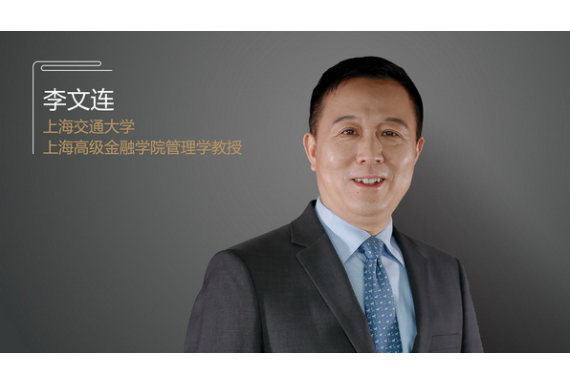
November 01, 2021
SAIF-Charles Schwab 2021 China Rising Affluent Financial Well-being Index Releas ...
On October 14th, 2021, the China Rising Affluent Wealth Management Forum, also known as the press conference for the 2021 China Rising Affluent Financial Well-being Index, was held. It was jointly organized by the Shanghai Advanced Institute of Finance (SAIF) and Charles Schwab (a top US financial services institution). This year's report focused on how affluent Chinese actively adjust their wealth management strategies when facing changing external environments. It also summarizes the changes in financial well-being and investment behavior for this group over the past five years. Professor Guangshao Tu (Adjunct Professor at SJTU and Executive Director of the SAIF Board), Lisa Hunt (Honorary Chairman of the Securities Industry and Financial Markets Association, Managing Director, Head of International at Charles Schwab), Professor Feng Li (Associate Director of CAFR, Co-Director of SAIFR, Professor of Accounting at SAIF), Professor Fei Wu (Term Professor at SAIF) and other related scholars participated in the press conference. They focused on the extensive changes in the way individual investors manage their wealth due to the COVID-19 pandemic, and had an in-depth discussion on how financial institutions should better serve Chinese investors based on new structural transformation trends for the global financial industry. At the beginning, Professor Feng Li delivered a welcome speech; he reviewed the cooperation on the China Rising Affluent Financial Well-being Index between SAIF and Charles Schwab over the past five years. He said that Charles Schwab is one of the leaders in the integrated wealth management industry and has rich practical experience in the field of wealth management — which lays a solid foundation for the cooperation between the two sides. He also hoped that continued cooperation would have further impact in the future. In Professor Guangshao Tu's speech, he shared his understanding and views on the released index and highly praised the significance of the cooperation between SAIF and international institutions. At the same time, he emphasized three points, including: enhancing financing awareness, improving financial planning, and strengthening asset management. He hoped that we can further develop domestic wealth management and asset management institutions, enhance the capabilities and professionalism of practitioners, and develop smart investment advisors. At the end of the forum, Professor Tu highlighted the fact that education is the foundation of wealth management. He pointed out that both individuals and institutions progress continuously in learning to manage wealth assets. Thus, it is necessary for SAIF to cooperate further with relevant parties, not only in the construction of think tanks and research but also in aspects of cultivating talent. During the conference, Lisa Hunt (Managing Director, Head of International Charles Schwab) interpreted the report in detail. According to the index, the overall level of China's rising affluent well-being increases reached new heights. In 2021, the Well-Being index was 72.02%, showing a slight increase of 2.29% as compared to 2020. Among the sub-indices, the Confidence and Engagement indices see significant year-on-year risesof 2.97% and 2.6%, reaching 74.18% and 79.23% (respectively) while Planning and Management indexes fall to 43.06% and 45.49%. Since the COVID-19 pandemic, more of China's rising affluent began to adopt new planning and management measures, including developing an understanding of risk appetite in line with industry standards (30.1%), regularly reviewing financial goals (27.8%), and adopting a professional, reasonable financial plan (24.1%). This, to some extent, raised their expectations about their future financial well-being. More respondents (19.8%) stated that they now have a higher possibility of achieving financial goals, as compared to 8.5% in 2020. At the same time, their understanding of wealth management has also improved. A significant portion of respondents now demonstrate an ability to accurately assess the components of good wealth management — 41.5% identify financial planning capability as a key element, with 44.1% identifying correct assessment of personal financial goals and 50.9% identifying reasonable asset allocation. During the discussion session, Professor Fei Wu said, "Facing a complex and changing external environment, the rising affluent have gradually recognized the importance of optimizing their personal and family wealth management strategies. This year's data shows that they are eager to improve their financial literacy, which indicates that the group is willing to adjust their investment method in response to pressure from the external environment and that they are financially prepared to achieve their life goals." As their demand for authoritative financial advice and knowledge increases, the affluent actively obtain information through financial institutions, financial platforms, and social media. These preferences are underpinned by growing trust in financial advisors and institutions over the last five years. In 2017, 57.8% reported high levels of trust. In 2021, 75.5% do, with just 0.6% reporting low trust. Similar increases have been recorded in respondents'opinions regarding the helpfulness and trustworthiness of financial platforms. More respondents (72.9%) now believe that platforms are very helpful, up from 56.2% in 2017. Levels of trust increased from 55.9% to 71.0% across the same period. In terms of social media, 64.6% prefer to view financial education information, and 77.7% like to consult articles published by authoritative financial institutions. Many respondents have shown interest in the ability of professional advisors and digital platforms to provide fundamental financial planning and management services. However, this year few respondents are thinking far ahead according to the low planning sub-index, indicating that they have not yet been able to transfer positive financial and investment ideas into practice. The survey also shows that the rising affluent should focus more on long-term investments to better achieve their financial goals. "Financial planning is the cornerstone of wealth management. We hope that financial institutions can work together to optimize their service models to better serve Chinese investors and help the rising affluent build a better future."Lisa Hunt emphasized in her speech. The China Rising Affluent Financial Well-being Index Initiated by SAIF and Charles Schwab, the China Rising Affluent Financial Well-being Index is now being carried out by Nielsen, an international monitoring and data analysis company. This index tracks the shifting perceptions about financial well-being of the people who are driving China's economic future. The 2021 Index helps financial professionals to better understand and explore the investment behaviors of China's rising affluent population in order to provide more services tailored for this group — which is of extreme importance to both Chinese and global economies. The survey interviewed more than 3,600 rising affluent individuals with annual incomes of RMB 125,000 to RMB 1,000,000 and with investable assets of less than RMB 7,000,000. The 15 cities covered in China included: Shanghai, Beijing, Guangzhou, Shenzhen, Chengdu, Hangzhou, Dalian, Xiamen, Chongqing, Wuhan, Nantong, Shijiazhuang, Zhongshan, Kunming, and Xiangyang. The questionnaire consists of 65 questions involving core issues related to index modeling.
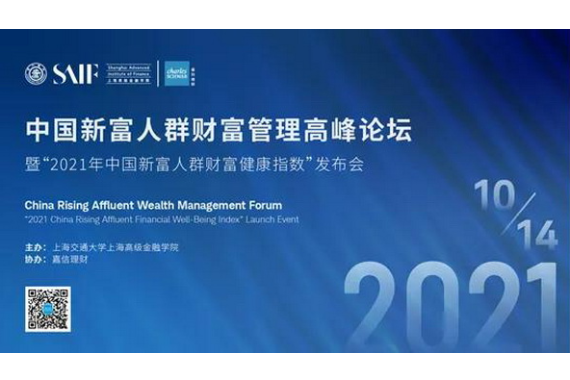
November 01, 2021
2021 China Real Estate Finance Summit Held
On October 28th, 2021, the 2021 China Real Estate Finance Summit was held in Lujiazui, Shanghai. This year's summit was jointly organized by SAIF and Shanghai Sunrise Equity Investment Fund Management. With the theme of "Breakthrough and Rejuvenation", the summit focused on the dilemma of the real estate downward cycle for the post-epidemic era. Many global academic scholars and senior experts from financial institutions and the real estate industry were invited to share their opinions about how to promote stable and healthy development of the real estate industry. The summit was presided over by Professor Hong Yan (Deputy Dean for Faculty and Research, Professor of Finance at SAIF) and Professor Jie Pan (Associate Dean, Deputy Secretary of the CPC SAIF Committee). Professor Chun Chang (Professor of Finance, Huifu Chair Professor, and Executive Dean at SAIF) delivered a welcome speech. Professor Chang said that China's economy was facing huge challenges and opportunities in a complex global economic situation. As both a world-class finance institute and a think tank, established by Shanghai Jiao Tong University for the construction of the Shanghai International Financial Center, SAIF has always been instrumental in the financial development of Shanghai. As the Shanghai International Financial Center begins its 14th Five-Year Plan development phase, SAIF will continue to take the initiative on the future development of real estate finance by cogently applying academic research and consulting on policy. Feng Lin (CEO of CIFI Holdings, Chairman of Sunrise Equity Investment Fund Management) delivered a speech as a SAIF alumnus and a co-organizer of the summit. He said in his speech that China's real estate has entered a historical stage of risk prevention, stock management, and long-term development. With the successive introduction of real estate regulation and the comprehensive pilot, and promotion of real estate tax, the financial situation is undergoing tremendous change. In this context, Sunrise Equity will further cooperate with SAIF and promote innovative development for China's real estate finance industry by organizing the China Real Estate Finance Summit as an exchange platform. To promote in-depth communication among the participants in various fields of real estate finance, three keynote speeches and four discussion sessions were arranged during the summit. The three keynote speeches were delivered by Professor Guangshao Tu (Adjunct Professor at SJTU and Executive Director of the SAIF Board), Professor Ming Lu (Special-Term Professor at SJTU, Executive Director of the China Development Research Institute), and Professor Peng Liu (Visiting Professor at SAIF, STB Distinguished Chair Professor of Real Estate and Finance at the Johnson College of Business, Cornell University). The themes of the speeches were "Real Estate Finance and Stock Asset Adjustment", "Housing in Large Cities from the Perspective of Spatial Governance", and "The Value and Reinvention of Commercial Real Estate for the Post-Epidemic Era". In the panel discussion, participants expressed their opinions and analyzed the difficulties and development opportunities of the industry on four topics, including: "Current Situation and Future Prospect of the REITs industry", "Innovation of Real Estate Technology", "Opportunities of Asset M&A under the New Situation", and "Opportunities and Practices of the None-Performing Assets in Real Estate Industry". Participants gave suggestions along different dimensions based upon their practical experience in the industry and their global perspective. In his closing speech, Professor Hong Yan (Deputy Dean for Faculty and Research, Professor of Finance at SAIF) thanked the participants for their dedication and discussion throughout the day. He also encouraged all participants to further exchange their ideas at the 5th China Real Estate Finance Summit next year.
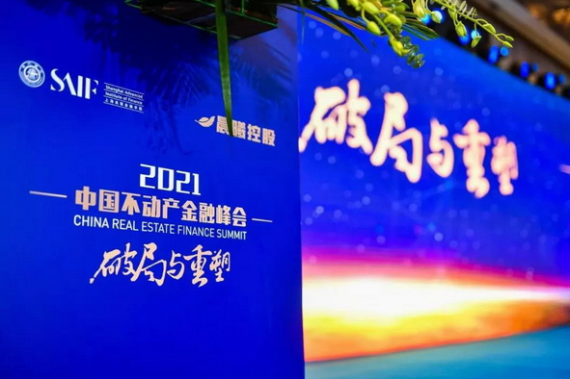
October 12, 2021
The Second NBER-SAIF Research Conference Held at SAIF
On May 20th – 21st, the second NBER-SAIF Research Conference was successfully held online. Organized by Professors James Poterba from the National Bureau of Economic Research (NBER) and Hong Yan from the Shanghai Advanced Institute of Finance (SAIF), this year’s conference focused on the theme of “Real Estate Markets and Housing Finance in China”. During the conference, eleven noted economists from NBER and nine scholars from the Asia-Pacific Region shared their research. About 100 experts from around the world discussed cutting-edge topics in China such as “the driving force of real estate markets” and “the economic foundation of housing finance”. The eleven experts from NBER were: James Poterba (President of NBER and Mitsui Professor of Economics at MIT), Joseph Gyourko (University of Pennsylvania), Ed Glaeser (Harvard University), Nancy Qian (Northwestern University), Hanming Fang (University of Pennsylvania), Maisy Wong (University of Pennsylvania), Mark Rosenzweig (Yale University), Shangjin Wei (Columbia University), Sheridan Titman (University of Texas at Austin), Ping Wang (Washington University in St. Louis), and Cecile Gaubert (University of California, Berkeley). SAIF Professors also attended the conference. They were: Professor Jiang Wang (Chair of Academic Advisory Council at SAIF; Professor of Finance at MIT, NBER), Professor Chun Chang (Professor of Finance and Executive Dean at SAIF), and Professor Hong Yan (Professor of Finance, Deputy Dean for faculty and research at SAIF). In the beginning, Professor Chun Chang delivered a welcome speech. He thanked NBRE and SAIF for holding this biennial conference which allowed participants to discuss important issues in finance. He also expressed his gratitude to economists who focused on real estate markets in China. In Professor James Poterba’s opening remarks, he reviewed the establishment of the NBER-SAIF conference. He pointed out that the NBER-SAIF series of conferences are designed to build a broader research community on the economics of public policies so that scholars and experts in China and America can share their research. Poterba said in his speech, “Since the two countries have close academic relations, it is very helpful to hold this transnational conference. In the current situation, it is especially important to maintain vibrant academic communication.” He also emphasized the significance of real estate finance in macroeconomics. In the keynote speech, Doctor Hui Shan (Chief China Economist at Goldman Sachs Research) analyzed the main features of China's housing market, compared its price to the international one, and discussed recent real estate regulatory policies and their ultimate goals. In the presentation and comment session, nine papers were discussed. They were: Chinese Housing Markets: New Data and the Potential Role of Hukou in Explaining Price-to-Rent Multiples; Aggregate and Distributional Impacts of LTV Policy: Evidence from China’s Micro Data; Property Rights, Prices and Speculation in Housing Markets: Evidence from China; Capital Leakage, House Prices, and Consumer Spending: Quasi-Experimental Evidence from House Purchase Restriction Spillovers; Unintended Consequences of Demand-side Housing Policies: Evidence from Household Reallocation of Capital; China's Housing Bubble, Infrastructure Investment, and Economic Growth; Housing Prices, Inter-generational Co-residence, and “Excess” Savings by the Young: Evidence using Chinese Data; City Characteristics, Land Prices and Volatility; Spatial Misallocation in Chinese Housing and Land Markets. In the closing remarks, Professor Jiang Wang, on behalf of SAIF, thanked James Poterba and NBER for holding this conference. He emphasized that NBER had made great contributions to economic and financial fields, and he hoped that NBER-SAIF conferences would provide scientific analysis for China’s rapidly growing economy by bringing together world leading experts. Professor Wang also pointed out that, due to the similarities between China and other markets, studying China’s economy will not only bring useful insights into China, but also generate common academic intuitions at a more fundamental level.
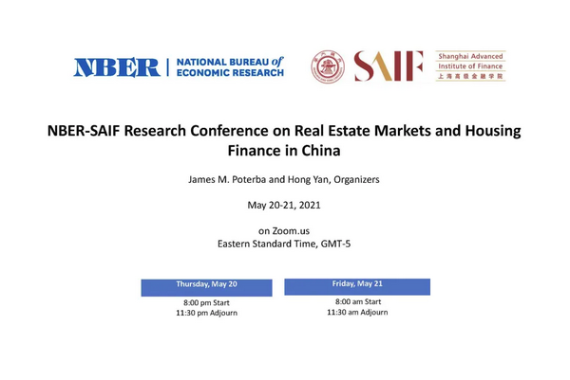
October 11, 2021
2021 Building Shanghai as an International Financial Center Seminar Held at SAIF ...
On August 24th, the 14th Five-Year Plan for the Building of Shanghai as an International Financial Center (the Plan) was released by the Shanghai Municipal People’s Government. On September 24th, the 2021 Building Shanghai as an International Financial Center seminar was held at the Xuhui Campus of SAIF by the Professional Research Committee of the International Financial Center at the Shanghai Financial Society (PRC). The conference was presided over by Professor Feng Li (Secretary of PRC, Professor of Accounting at SAIF, Associate Director of CAFR, and Co-Director of SAIFR). Professor Qigui Zhu (Chair of the PRC, Secretary of the CPC SAIF Committee) delivered a welcome speech. He summarized achievements made in the construction of Shanghai as an International Financial Center and the new objectives proposed in the Plan. He also reviewed work accomplished by the PRC in the past year. As the Chair Institution of the PRC, SAIF used its think tanks to give high-quality reports on important financial issues, organized several seminars to interpret the policies, and gave suggestions on the implementation of specific measures. Changqing Liu, Deputy Director of the International Financial Research Department of the People's Bank of China (Shanghai Headquarters),said in his speech that Shanghai aims to be the central node of domestic circulation and the strategic link between domestic and international dual circulation. Shanghai should also become the center of RMB products and an upgraded International Financial Center. Therefore, further expanding financial opening-up, attracting more international investors, and providing more RMB financial products to the world have become important tasks for Shanghai as an International Financial Center. Liu said that this transformation is full of opportunities and challenges, and it cannot succeed without advice given by scholars and experts. Doctor Ting Wu (Associate Researcher at CAFR) reported the main contents of the 2021 International Financial Center Development Report. The Report was jointly co-authored by the PRC, the People's Bank of China (Shanghai Headquarters), and SAIF. It analyzes authoritative data from financial markets at home and abroad and compares Shanghai with New York, London, and other famous international financial centers in order to annually interpret differences and assess development. More than 20 scholars and experts from different institutions and universities attended the seminar, including: China Financial Futures Exchange, China Foreign Exchange Trade System & National Interbank Funding Center, Shanghai Commercial Paper Exchange Corporation, People's Bank of China, Bank of Communications, SAIF, etc. In the discussion session, participants shared their opinions on the 2021 International Financial Center Development Report and made positive suggestions on the development of Shanghai as an International Financial Center.
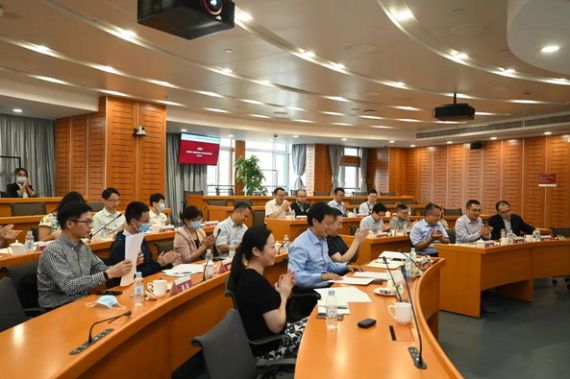
October 08, 2021
2021 SAIF Faculty and Staff Autumn Semester Meeting Held
On September 23rd, the Faculty and Staff Autumn Semester meeting was held at SAIF. Professors Chun Chang (Executive Dean, Huifu Chair Professor at SAIF), Qigui Zhu (Secretary of the CPC SAIF Committee), and Jiang Wang (Executive Director, Chair of Academic Council at SAIF) delivered speeches. Nearly 200 SAIF professors and staff attended the conference. Professor Chun Chang said that SAIF has progressed well in many aspects during the past year, including: the Phase III Strategic Plan (2021-2030), faculty construction, think-tank construction, talent training, and external cooperation. He emphasized that the current situation requires further promotion of academic, think tank, and applied research — as well as talent training, which brings both development opportunities and new challenges to SAIF. He urged all faculty and staff to focus on research and innovation to support talent cultivation and face challenges. Professor Qigui Zhu said that 2021 is the first year of both the SAIF Phase III Strategic Plan (2021-2030) and the third phase of China’s 14th Five-Year Plan, and that we should make every effort to achieve these goals. Professor Jiang Wang pointed out in his concluding speech that there are two keys to achieve goals faster and with a better outcome. One is to implement the specific tasks to make sure that the Plan proceeds at a steady pace. The other is to innovate.
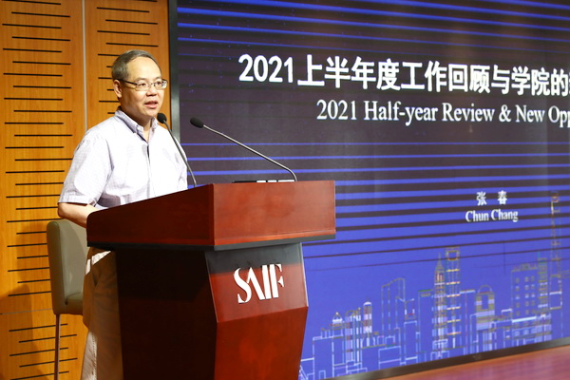
September 22, 2021
2021 MF Opening Ceremony Held at SAIF
From September 13th to September 15th, the 2021 MF Opening Ceremony was held at the Shanghai Advanced Institute of Finance (SAIF). This year's orientation week was held in a combined online and on-site format, which enabled students from all over the world to attend. MF2021 has 71 students from China and overseas. Due to the pandemic, international students in Italy, France, Germany, and Malaysia attended the ceremony virtually. During the ceremony, Professor Chun Chang (Huifu Chair Professor, Executive Dean at SAIF) delivered a welcome speech. In his speech, he encouraged students to balance the following four aspects in their future life at SAIF: the balance between long-term and short-term goals, between the expectation from your parents and your own pursuits, between personal values and social responsibilities, and between study and enjoying life. Professor Tan Wang (MF Academic Director, Professor of Finance at SAIF), Professor Xianglin Li (MF Academic Co-Director, Associate Director of CAFR, Professor of Practice at SAIF), Hongjun An (Founder and Chairman of Genharmony), Professor Chao Zi (Assistant Professor at SAIF), Lin Yang (Director of MF Program) and all MF Program staff attended the opening ceremony. Hongjun An, Professor Wang, and the MF Program Head Ms. Lin Yang shared their life experiences and conveyed their best wishes to the 2021 class. As freshmen at SAIF, MF-General21 student Xiaoshuang Chen (graduate from Peking University with a Bachelor's degree in Economics) and MF-Fintech21 student Junming Chen (graduate from Tsinghua University with a Bachelor's degree in Automation) expressed their excitement and expectation for their new start at SAIF. Taoran Wang from MF-General20 and Yufang Peng from MF-FinTech20 also shared their learning and living experiences at SAIF as senior representatives. Professor Wenjun Qiu (Guest Professor of Practice at SAIF) encouraged students to integrate theory with practice in their study and to actively participate in the CFA Research Challenge. In order to help students better adapt to their upcoming new life at SAIF, the staff from various departments gave an in-depth overview of SAIF MF's curriculum design and comprehensive services. Professor Jie Hu, Professor of Practice at SAIF and former CEO of the Financial Division at Xunlei Group, brought an impressive first class to the students, entitled "A New Face of the Old Financial Kingdom". Professor Hu guided the students in a review of the past, present and future of the financial world, inspiring an industry-oriented macro perspective and deepening their understanding of the industry. Mr. Zhang, who had worked at JP Morgan in London, brought a wonderful practical course to the students, giving them a glance at the financial workplace and training their networking skills. Standing at the starting point of a meaningful new journey, the students wrote down small objectives for the next two years and their wishes for the future. The program team then sealed these "time capsules" for them to open in person when they graduate two years later.
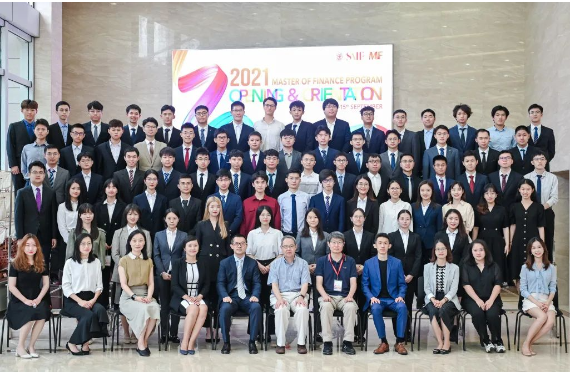
September 22, 2021
Professors Jun Pan and Jiang Wang’s Paper in the Journal of Financial Economic ...
Professor Jun Pan (Chair Professor at SAIF) and Professor Jiang Wang (Chair of Academic Council at SAIF)'s paper "Premium for Heightened Uncertainty: Explaining Pre-Announcement Market Returns"has been accepted for publication in the Journal of Financial Economics (JFE). JFE is one of the Top 3 international financial journals in the world, along with Journal of Finance (JF) and Review of Financial Studies (RFS). It is a peer-reviewed academic journal covering both theoretical and empirical types of research within financial economics. The paper's co-authors are Professor Xing Hu (PBC School of Finance at Tsinghua University) and Professor Haoxiang Zhu (Sloan School of Management at MIT). Abstract of the Paper: We find large overnight returns with no abnormal variance before nonfarm payrolls, ISM, and GDP announcements, similar to the pre-FOMC returns. To explain this common pattern, we propose a two-risk model with the uncertainty about the magnitude of the impending news'market impact as an additional risk, and link the pre-announcement return directly to the accumulation of heightened uncertainty and its later resolution prior to the announcement. We empirically test and verify the model's distinct predictions on the joint intertemporal behavior of return, variance, and particularly VIX – a gauge of impact uncertainty by our model, surrounding macroeconomic announcements.
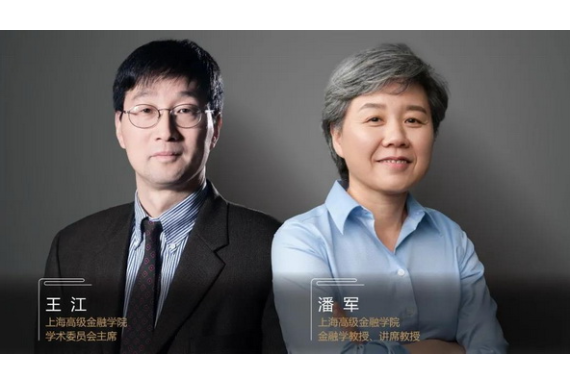
September 20, 2021
Italian Student Gianluca Joined SJTU Again to Fulfill his Dream
Gianluca Salvicchi was born in Rome. At the age of 13, he started to learn Mandarin and, up to now, has visited Shanghai three times and has studied at SJTU twice. Gianluca is fond of Chinese culture, appreciates education in China, and has confidence in China's economic development. He also acquired a Chinese name -"Zhan LuJiang". Now, at the age of 22, Gianluca has been enrolled in the MF program at SAIF. He's looking forward to his life as a SAIFer and it has always been his dream to study in Shanghai. "I will be able to merge my two loves, China and Finance", he said. Studying at SJTU Again The story between Gianluca and China began when he was in his senior year of high school in Italy. At the age of 13, he became curious about China, a country also possessing an ancient civilization. When he first came to Shanghai for an exchange program, he fell in love with the city immediately. After the one-year exchange, he extended for another year and decided to study in China for a bachelor degree. In 2017, he was admitted to the School of Electronic Information and Electrical Engineering of SJTU and became an engineering student. Unfortunately, for family reasons, he had to quit SJTU at that time. "Compared to the metro system in Rome, I'm more familiar with the one in Shanghai. It carries my memories of this city". After visiting Shanghai three times, Gianluca is profoundly attracted by the city. He believes that China and SJTU have encouraged him a lot, allowing him to broaden his horizons and helping him with his future development. Influenced by his father, Gianluca has been very interested in financial knowledge since he was a child. After returning to Italy, he entered the Libera Università Internazionale degli Studi Sociali (LUISS Guido Carli), known as the "Harvard of Italy", to study economics. During the four years study at university, a friend introduced him to the development of the SJTU Minhang Business Area. He learned that China was developing rapidly and he was even more optimistic about China's future economic development. "China is seeking its path of development, and I'm happy to see its energy and capacity. I believe that Shanghai will further expand its competitiveness as an international financial center. The internationalization of the RMB is also around the corner. I hope I can contribute to the development of China's finance development in the future." For Gianluca, SJTU is his second home, and SAIF is the perfect choice to combine his interests in both China and Finance. Therefore, it is no surprise for him to choose SAIF. "It has everything I want - professional knowledge, financial skills. And it can help me return to Shanghai and support me with my future career," he said. Choosing SAIF As a finance student, Gianluca had always been interested in secondary market investment activities and macroeconomic developments. He has used his professional knowledge to manage his personal assets and achieved good results. In the future, he hopes to create value for his clients in the same way. "I want to become a good wealth management advisor and I hope to set up my own hedge fund in the future." Though it's not time for school yet, Gianluca has already started preparatory courses, including: Overview of Financial Markets, Business Chinese, Introduction to Python, C and C++ Programming. "These preparatory courses at SAIF helped me consolidate and deepen my understanding of financial knowledge," Gianluca said. "The programming courses and other skills courses can help me become an inter-disciplinary talent. And the Chinese language course arranged specifically for international students is good for my business communication skills." He also received one-to-one career counseling from the CDC, which benefited him a great deal. "The coach objectively pointed out my shortcomings and strengths, gave me advice on course selection, and also taught me some interview skills, which gave me confidence in my future career development."Gianluca was deeply moved by the thoughtfulness of the CDC staff. To avoid late-night courses for international students, they arranged time reasonably. "Although school has not started yet, SAIF has already provided various preparatory courses and career planning for students. I think it is very professional and I can also feel its warmth and love." Due to the coronavirus, Gianluca will take courses virtually at this stage. He is looking forward to the upcoming semester, "I hope the pandemic will be controlled soon. And I hope to study in the SAIF classroom as soon as possible."In the future, besides further enhancing his financial knowledge and skills at SAIF, he also hopes to found a club to study secondary markets with friends. "SAIF is a platform that gathers finance talents in and beyond China. I believe we can work out a lot of interesting ideas here!" Gianluca likes asking questions because he enjoys the intellectual challenge when seeking answers. Despite setbacks sometimes, he believes that he will grow quickly in this process of exploration. As a foreigner, he often describes himself as "a foreign body with a Chinese soul". He believes that with the support of SAIF, his future will be promising.


211 West Huaihai Road
Shanghai 200030, China
Tel: +86 21 6293 3500
9th Floor, Building T6, Hongqiao Hui
990 Shenchang Road
Shanghai 201106, China
3rd Floor, Building D, Chenfeng Building
800 Tongpu Road
Shanghai 200062, China
5th Floor, West Tower, World Financial Centre
1 Dong San Huan Middle Road
Chaoyang District, Beijing 100020, China
Tel: +86 10 5081 5880
1203 Tower 7, One Shenzhen Bay
Nanshan District, Shenzhen 518000, China
Tel: +86 755 8663 8815
© Shanghai Advanced Institute of Finance All Rights Reserved.


Top